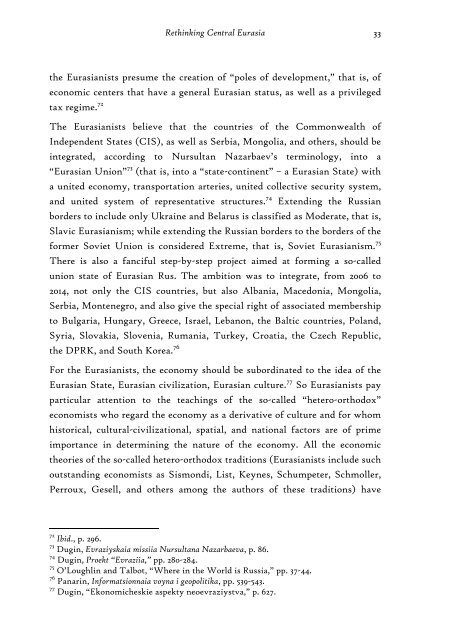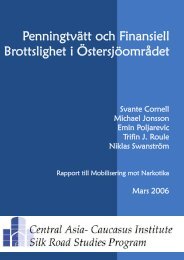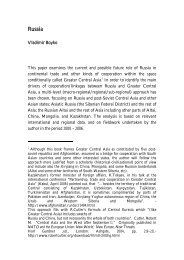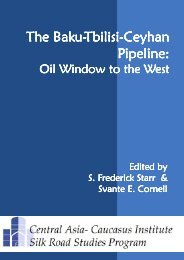Eurasianism and the Concept of Central Caucaso-Asia
Eurasianism and the Concept of Central Caucaso-Asia
Eurasianism and the Concept of Central Caucaso-Asia
You also want an ePaper? Increase the reach of your titles
YUMPU automatically turns print PDFs into web optimized ePapers that Google loves.
Rethinking <strong>Central</strong> Eurasia 33<br />
<strong>the</strong> Eurasianists presume <strong>the</strong> creation <strong>of</strong> “poles <strong>of</strong> development,” that is, <strong>of</strong><br />
economic centers that have a general Eurasian status, as well as a privileged<br />
tax regime. 72<br />
The Eurasianists believe that <strong>the</strong> countries <strong>of</strong> <strong>the</strong> Commonwealth <strong>of</strong><br />
Independent States (CIS), as well as Serbia, Mongolia, <strong>and</strong> o<strong>the</strong>rs, should be<br />
integrated, according to Nursultan Nazarbaev’s terminology, into a<br />
“Eurasian Union” 73 (that is, into a “state-continent” – a Eurasian State) with<br />
a united economy, transportation arteries, united collective security system,<br />
<strong>and</strong> united system <strong>of</strong> representative structures. 74 Extending <strong>the</strong> Russian<br />
borders to include only Ukraine <strong>and</strong> Belarus is classified as Moderate, that is,<br />
Slavic <strong>Eurasianism</strong>; while extending <strong>the</strong> Russian borders to <strong>the</strong> borders <strong>of</strong> <strong>the</strong><br />
former Soviet Union is considered Extreme, that is, Soviet <strong>Eurasianism</strong>. 75<br />
There is also a fanciful step-by-step project aimed at forming a so-called<br />
union state <strong>of</strong> Eurasian Rus. The ambition was to integrate, from 2006 to<br />
2014, not only <strong>the</strong> CIS countries, but also Albania, Macedonia, Mongolia,<br />
Serbia, Montenegro, <strong>and</strong> also give <strong>the</strong> special right <strong>of</strong> associated membership<br />
to Bulgaria, Hungary, Greece, Israel, Lebanon, <strong>the</strong> Baltic countries, Pol<strong>and</strong>,<br />
Syria, Slovakia, Slovenia, Rumania, Turkey, Croatia, <strong>the</strong> Czech Republic,<br />
<strong>the</strong> DPRK, <strong>and</strong> South Korea. 76<br />
For <strong>the</strong> Eurasianists, <strong>the</strong> economy should be subordinated to <strong>the</strong> idea <strong>of</strong> <strong>the</strong><br />
Eurasian State, Eurasian civilization, Eurasian culture. 77 So Eurasianists pay<br />
particular attention to <strong>the</strong> teachings <strong>of</strong> <strong>the</strong> so-called “hetero-orthodox”<br />
economists who regard <strong>the</strong> economy as a derivative <strong>of</strong> culture <strong>and</strong> for whom<br />
historical, cultural-civilizational, spatial, <strong>and</strong> national factors are <strong>of</strong> prime<br />
importance in determining <strong>the</strong> nature <strong>of</strong> <strong>the</strong> economy. All <strong>the</strong> economic<br />
<strong>the</strong>ories <strong>of</strong> <strong>the</strong> so-called hetero-orthodox traditions (Eurasianists include such<br />
outst<strong>and</strong>ing economists as Sismondi, List, Keynes, Schumpeter, Schmoller,<br />
Perroux, Gesell, <strong>and</strong> o<strong>the</strong>rs among <strong>the</strong> authors <strong>of</strong> <strong>the</strong>se traditions) have<br />
72 Ibid., p. 296.<br />
73 Dugin, Evraziyskaia missiia Nursultana Nazarbaeva, p. 86.<br />
74 Dugin, Proekt “Evraziia,” pp. 280-284.<br />
75 O’Loughlin <strong>and</strong> Talbot, “Where in <strong>the</strong> World is Russia,” pp. 37-44.<br />
76 Panarin, Informatsionnaia voyna i geopolitika, pp. 539-543.<br />
77 Dugin, “Ekonomicheskie aspekty neoevraziystva,” p. 627.






